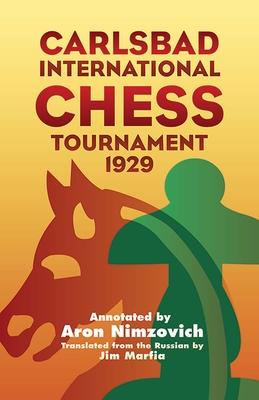"His abrasive, biting wit shines through his prose even in translation ... always sparkling and provocative." -- Chess News
Known as "The Father of Modern Chess" and "The Stormy Petrel of the Chess World," Aron Nimzovich (1886-1935) transformed his greatest performance into a brilliantly eccentric and entertaining book. In this account of his victory at the 1929 Carlsbad Tournament, Nimzovich offers a captivating retrospective of his triumph over some of the best of his contemporaries: Capablanca, Spielman, Maroczy, Rubinstein, Marshall, Euwe, Bogolyubov, Tartakower, Smisch, and ten others.
Nimzovich's introduction argues that the chess world is morally obligated to arrange a match between himself and Alekhine, the world champion who avoided possible defeat by simply not playing among strong competitors, including Nimzovich. He continues his case in a tart analysis of Carlsbad's 30 best games, including his tense duel with Capablanca (drawn), and the brilliancy prize game between Smisch and Grnfeld. Nimzovich offers psychological interpretations of style and personal character as revealed in the play of Capablanca, Spielmann, and Rubinstein, as well as a selection of instructive games from among the non-prizewinners.

"His abrasive, biting wit shines through his prose even in translation ... always sparkling and provocative." -- Chess News
Known as "The Father of Modern Chess" and "The Stormy Petrel of the Chess World," Aron Nimzovich (1886-1935) transformed his greatest performance into a brilliantly eccentric and entertaining book. In this account of his victory at the 1929 Carlsbad Tournament, Nimzovich offers a captivating retrospective of his triumph over some of the best of his contemporaries: Capablanca, Spielman, Maroczy, Rubinstein, Marshall, Euwe, Bogolyubov, Tartakower, Smisch, and ten others.
Nimzovich's introduction argues that the chess world is morally obligated to arrange a match between himself and Alekhine, the world champion who avoided possible defeat by simply not playing among strong competitors, including Nimzovich. He continues his case in a tart analysis of Carlsbad's 30 best games, including his tense duel with Capablanca (drawn), and the brilliancy prize game between Smisch and Grnfeld. Nimzovich offers psychological interpretations of style and personal character as revealed in the play of Capablanca, Spielmann, and Rubinstein, as well as a selection of instructive games from among the non-prizewinners.